-
Notifications
You must be signed in to change notification settings - Fork 72
Setup Throttle Kill Switch
As a safety feature, it is recommended to configure one of the switches as throttle kill switch, i.e. disabling the throttle altogether by flipping the switch. This prevents starting the motor by accident - it is easy to inadvertently move the throttle stick.
There are at least two ways how to do this:
In this method, we use SwA as the Throttle curve switch. The main advantage
of this approach is to have the kill switch in the engaged position by default,
i.e. the throttle is not working without flipping the SwA switch first
from it's default position, which is also checked at power-on.
Firstly, go set up SwA as Idle mode:
Key → Switches assign
Idle mode SwA
Then go to the Key → Throttle curve menu, and set all the points in the Normal curve to zero:

Then flip the SwA switch, and the Idle up curve is displayed.
Configure it as linear from 0 % to 100 %:

Alternatively, when both throttle curves are needed for some other purpose than the throttle kill switch, it is possible to use the Throttle hold feature. The disadvantage of this approach is that it is not possible to configure the switch to be in the throttle disabled position by default, after power-on.
Firstly, set SwA as throttle hold switch:
Key → Switches assign
Thro. hold SwA
Then set the holding level to be 0 %:
Key → Throttle hold
Hold On
Value 0 %
The assignment of switches to various internal functions
(thottle hold, teacher/student, dual rate, throttle idle-up)
in the Key → Switches assign menu works regardless of the assignment
of these switches to a particular servo channel, and regardless of reversing
the said channel in the Key → Reverse menu. These features work even
without assigning the switch to a channel at all in the
Key → Aux channels menu.